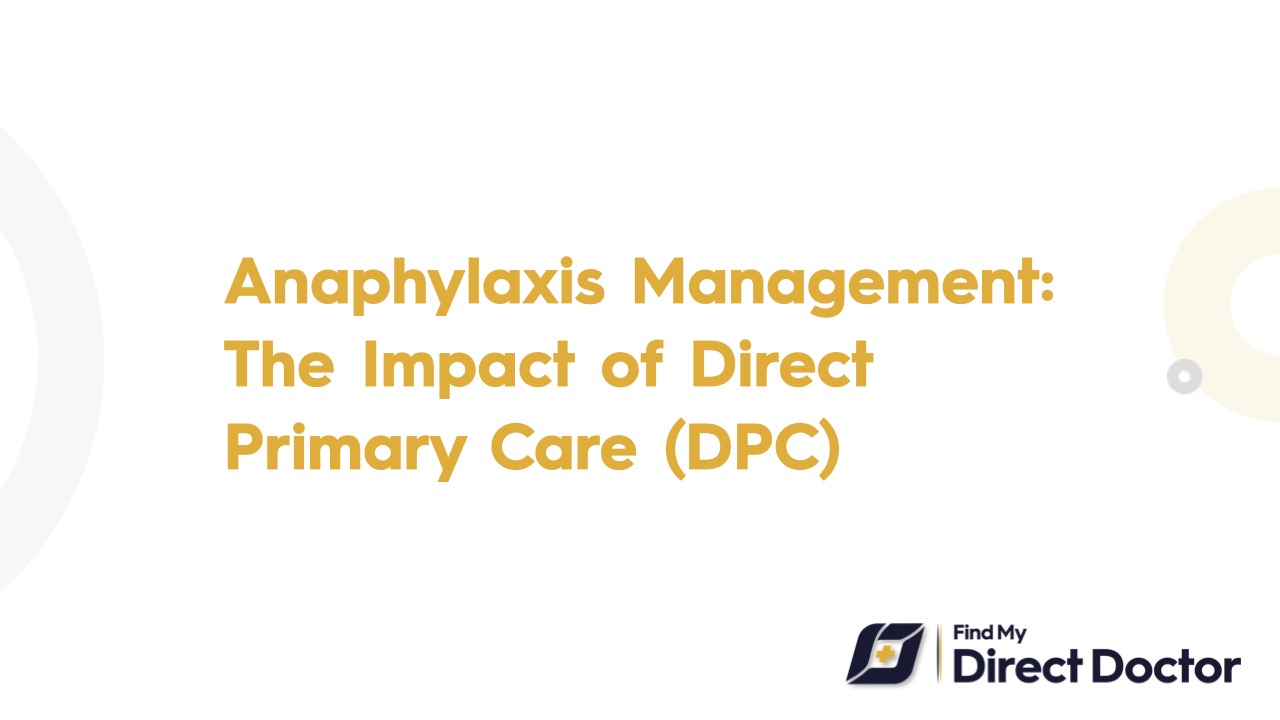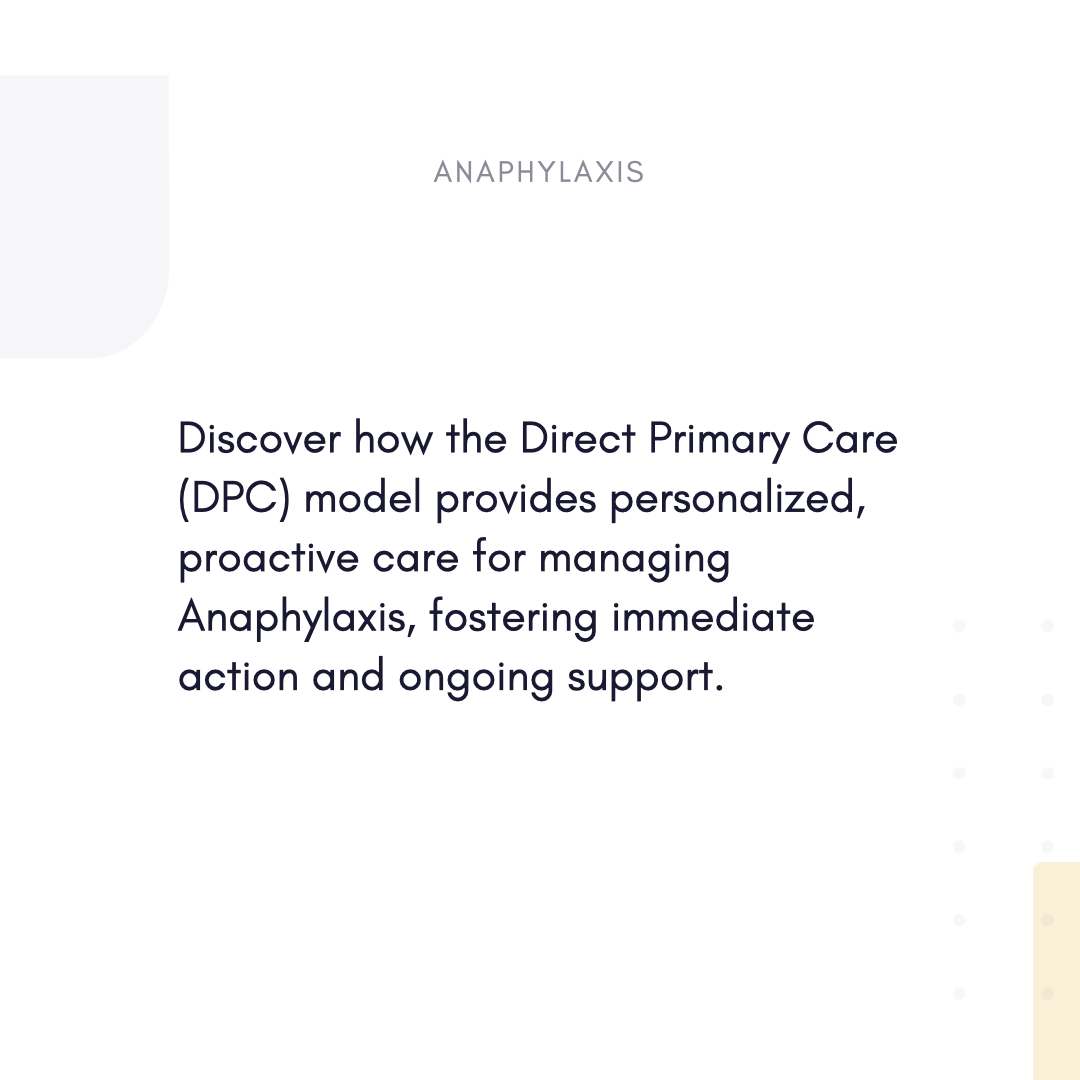Anaphylaxis and Direct Primary Care (DPC): Lifesaving, Proactive Care for Severe Allergies
Anaphylaxis is a severe, life-threatening allergic response needing quick intervention with epinephrine. Foods, insect stings, drugs, latex, or other triggers can all cause fast-onset symptoms including hives, vomiting, throat swelling, and shock. Providing a patient-centered approach to control anaphylaxis risks, direct primary care (DPC) guarantees timely access to treatment, customized emergency plans, and ongoing support to stop next episodes.

Recognizing Anaphylaxis: Main Difficulties
- Triggers: Peanuts, shellfish, bee stings, penicillin, latex
- Symptoms: Hives, dyspnea, facial/throat swelling, vertigo, drop in blood pressure
- Complications: Respiratory failure, cardiac arrest, biphasic anaphylaxis
How DPC Improves Management of Anaphylaxis
Providing unlimited access to a primary care physician, Direct Primary Care (DPC) is a membership model (USD50–USD150/month). For patients with anaphylaxis, this means:
- 24/7 availability for rapid direction during reactions
- Open pricing—discounted epinephrine auto-injectors, allergy testing, and expert referrals
- Holistic treatment addressing long-term safety, emergency readiness, and preventability
1. Fast Diagnosis and Emergency Readiness
- Allergy testing: Skin prick tests or serum IgE blood work to identify triggers
- Customized action plans: Step-by-step emergency protocols for patients/caregivers
- Epinephrine access: Auto-injector prescriptions (EpiPen, Auvi-Q) at wholesale rates
2. Individualized Preventive Measures
Using AAAAI recommendations, DPC combines:
- Trigger avoidance: Label-reading strategies, dining tips, insect sting prevention
- Immunotherapy referrals: For insect venom allergies (bees, wasps) to reduce sensitivity
- Medication management: Antihistamines/corticosteroids for mild reactions
3. Post-Reaction Monitoring
- Review episodes to refine prevention strategies
- Track patients 12–24 hours post-epinephrine to prevent biphasic reactions
- Caregiver training: Symptom recognition and auto-injector techniques
DPC's Advantage for Anaphylaxis Patients
Accessibility and Instant Care
- Same-day visits for post-reaction follow-ups or new symptoms
- 24/7 telehealth support for ER coordination and injection guidance
Customized Education
- Tailored emergency plans for home, school, or workplace crises
- Hands-on auto-injector training and symptom drills
Continuity of Care
- Long-term monitoring: Update prevention plans for lifestyle/trigger changes
- Regular check-ins ensure auto-injectors and action plans stay current
Individualized Anaphylaxis Management in DPC
The AAAAI stresses personalized treatment. DPC provides:
1. Education and Empowerment
- Symptom recognition drills to build patient/caregiver confidence
- Trigger-specific guidance for food, insect, or drug allergies
2. Emergency Action Plans
- Age/trigger/environment-specific protocols (e.g., school, travel)
- School/business coordination: Training letters for teachers/employers
3. Preventive Management
- Annual allergy testing to identify new/resolved triggers
- Lifestyle adjustments: Collaborate with allergists/dietitians for risk reduction
Personal Success Stories from Real Life
- Liam, 8: Avoided hospitalization after a peanut reaction with DPC’s telehealth-guided epinephrine use
- Sophia, 30: Saved USD400/year on Auvi-Q pens via DPC’s wholesale pricing
FAQs: DPC and Anaphylaxis
- Q: Can DPC prescribe epinephrine auto-injectors?
A: Yes! DPC doctors prescribe EpiPens/Auvi-Q and train patients on proper use
- Q: Should I see an allergist?
A: DPC arranges discounted immunotherapy referrals for complex cases
- Q: What does allergy testing cost?
A: Skin prick tests start at USD100; blood panels cost USD150–USD200
Why DPC Is Crucial for Anaphylaxis Treatment
- Saves lives: Immediate access to guidance during reactions
- Reduces costs: Affordable epinephrine and testing remove financial barriers
- Builds confidence: Education and drills ensure quick patient/caregiver action
How DPC Specifically Improves Anaphylaxis Control
DPC aligns with AAAAI standards by:
- 24/7 readiness: No delays in epinephrine use or ER coordination
- Tailored prevention: Custom plans for food, insect venom, or drug triggers
- Ongoing support: Regular visits keep patients informed and prepared
Gain Control of Your Safety with DPC
While anaphylaxis is unpredictable, your care doesn’t have to be. DPC partners with you to ensure:
- Preparedness with personalized emergency plans
- Empowerment through education and training
- Protection via affordable, accessible care when seconds count






